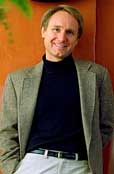"Da Vinci Code" judge unimpressed by either side
In ruling that Dan Brown had not ripped off the ideas of two other authors for his blockbuster "The Da Vinci Code," London High Court judge Peter Smith vowed to refrain from any comments on the "literary worth" of the books in question.

But that did not mean he would hold back on other matters.
For instance, the testimony of plaintiff Michael Baigent.
"Mr. Baigent was a poor witness. Those are not my words: they are the words of his own Counsel in his written closing submissions," Smith wrote in a 71-page decision issued Friday. "Those words do not in my view do justice to the inadequacy of Mr. Baigent's performance."
And the testimony of Baigent's co-author, Richard Leigh.
"I am not sure what Mr. Leigh thought was the purpose of his evidence," Smith observed. "He seemed to want to have a fight over something and was clearly disappointed at the relative shortness of his cross examination."
Smith surprised almost nobody in rejecting a copyright-infringement claim by Baigent and Leigh, authors of "The Holy Blood and the Holy Grail," who alleged that Brown's blockbuster "appropriated the architecture" of their 1982 book. In the United States, the book is titled "Holy Blood, Holy Grail."
But his ruling was far more than a dry summation of evidence and precedent. Smith also took on the roles of historian, scold and, promises to the contrary, literary critic.
Although clearly impressed by Brown's success "The skill of the great is always ... in making it all seem very easy", he was hardly taken by the author's approach to his work. Smith found Brown a disciplined but passive figure, so dependent on the research of his wife, Blythe Brown, that he was unable to offer clear answers on the stand about when they first read "Holy Blood, Holy Grail."
"I do not believe he consciously lied," Smith wrote. "His failure to address these points in my view shows once again that the reality of his research is that it is superficial."
The judge could not help pointing out, too, that the author's ideas were less than divinely inspired. He noted that Brown "wishes to create `gray' areas, not black and white. He simply needs therefore a mystery and a series of unanswered questions.
"He can do that without deep research," Smith wrote, "and that he has done."
The judge was deeply irritated by the absence of Blythe Brown, who remained at the author's home in New Hampshire. Dismissing the author's concerns for her privacy, as if Dan Brown were a student saying the dog had eaten his homework, Smith said he suspected Blythe Brown did not want to admit that she had read "Holy Blood, Holy Grail" far earlier than her husband had believed.
While skeptical about the Browns, the judge almost pitied their accusers, as witnesses and as writers. He read "Holy Blood" multiple times and found their claims contrived and insupportable, though he did praise them for a "very interesting book to read whether or not it is credible."
Smith speculated that they were jealous of Brown's success, and he wondered why they could not appreciate the "genuine and handsome recognition of their role" in the novel, which openly acknowledges their book. But he would not accept that the lawsuit was a scheme by both sides to make money.
"It is a testament to cynicism in our times that there have been suggestions that this action is nothing more than a collaborative exercise designed to maximize publicity for both books," he wrote, noting that sales had surged for all the authors involved.
"I am not in a position to comment on whether this cynical view is correct, but I would say that if it was such a collaborative exercise, Mr. Baigent and Mr. Brown both went through an extensive ordeal in cross-examination which they are likely to remember for some time", reports AP.
O.Ch.
Subscribe to Pravda.Ru Telegram channel, Facebook, RSS!




